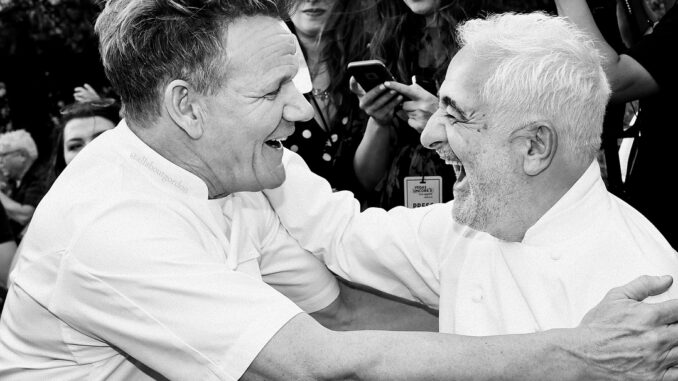
When the world hears the name Gordon Ramsay, it often conjures up images of a fiery culinary genius—intimidating in the kitchen, exacting in standards, and unrelenting in pursuit of excellence. But behind the world-class chef, television titan, and global entrepreneur is a childhood marked by hardship, instability, and one deeply complicated relationship: the one he had with his father.
For all the success Ramsay has achieved, it is his past—particularly his upbringing with an abusive father—that shaped both the man and the myth. The story of Gordon Ramsay and his father is not one of cozy father-son bonding or shared passions over a simmering pot. It is a story of pain, struggle, and ultimately, resilience.
Gordon James Ramsay was born in Johnstone, Scotland, in 1966, but spent most of his early life in Stratford-upon-Avon, England. His father, Gordon Sr., worked various jobs—some legitimate, some not—but he battled alcoholism and emotional instability. In interviews and memoirs, Ramsay has often described his dad as “a hard-drinking womanizer” who was abusive and frequently absent.
The Ramsay family moved repeatedly during Gordon’s youth, often due to unpaid bills or his father’s inability to hold down steady employment. This instability deeply affected young Gordon and left scars that would influence his drive and temperament later in life.
Like many boys in difficult homes, Gordon turned to sports as both a distraction and a dream. He was passionate about football and showed real promise as a young player. By the time he was a teenager, he was playing for Oxford United and eventually joined the youth team at Glasgow Rangers.
It was in football that Gordon found discipline, structure, and the attention he craved. But a series of knee injuries would crush those dreams by the age of 18.
And with that dream gone, the only other escape route lay in a place few would have predicted: the kitchen.

When Gordon Ramsay began working in professional kitchens, he found something he had never had at home—mentorship. Though chefs like Marco Pierre White and Guy Savoy were famously demanding and brutal, Gordon respected them. Why? Because their discipline came with purpose—not drunken rage.
These chefs, harsh as they were, held Gordon to standards and taught him how to channel anger into precision, fear into focus. In a way, they became the father figures he never had.
In the culinary world, Ramsay found what he had been denied at home: direction, challenge, and—eventually—respect.
Despite the emotional scars, Gordon Ramsay did attempt to build some kind of relationship with his father in adulthood. But it was never easy. Gordon Sr. never quite understood or respected his son’s path. In some ways, he even resented it.
When Ramsay opened his first restaurant, Restaurant Gordon Ramsay, in 1998, his father was not part of the celebrations. The two were estranged. There was no tearful reunion, no heartfelt congratulations.
The break between them became final when Gordon Sr. passed away in 1997. Ramsay was devastated, not just by the loss, but by the unresolved tension—the words left unsaid, the apologies never made, the bond that never was.
While Ramsay’s relationship with his father was painful, it became part of the fire that fueled his ambition. His relentless work ethic, his perfectionism, and even his famously sharp temper can be traced back to a boy who never got the affirmation he craved.
In his shows like Hell’s Kitchen and Kitchen Nightmares, audiences see a man who demands excellence and won’t tolerate excuses. Some criticize him for being too harsh—but for Gordon, the stakes are personal. He’s not just mentoring chefs—he’s demanding from them what he once needed: stability, strength, and accountability.
The greatest testament to Gordon Ramsay’s journey may not be found in his restaurants or television deals, but in the way he parents his own children. Gordon and his wife Tana have five kids, and by all accounts, he is an involved, loving, and intentional father.
With his youngest son Oscar, born in 2019, Gordon often shares tender moments online—beach walks, bedtime cuddles, silly videos in the kitchen. It’s a side of Ramsay the world rarely saw in earlier years. But it’s clear: he is determined to give Oscar and his other children the childhood he never had. “I made myself a promise,” he once said. “That I would never let my kids feel the way I felt.”
That promise has become a guiding principle in his life. He teaches his children the value of hard work—but without fear. He holds them accountable—but with love.
Gordon Ramsay’s relationship with his father was painful, complicated, and unresolved. But rather than letting it define him negatively, he used it as a foundation to build something better—not just for himself, but for generations to come.
In every dish he perfects, in every young chef he mentors, and in every bedtime story he reads to Oscar, Gordon rewrites his own story. One filled not with rage and fear—but with resilience, forgiveness, and growth. Because sometimes the greatest legacy isn’t what you inherit from your father—it’s what you choose to change. And Gordon Ramsay? He chose to change everything.
